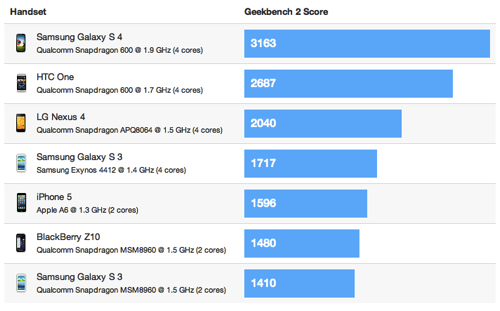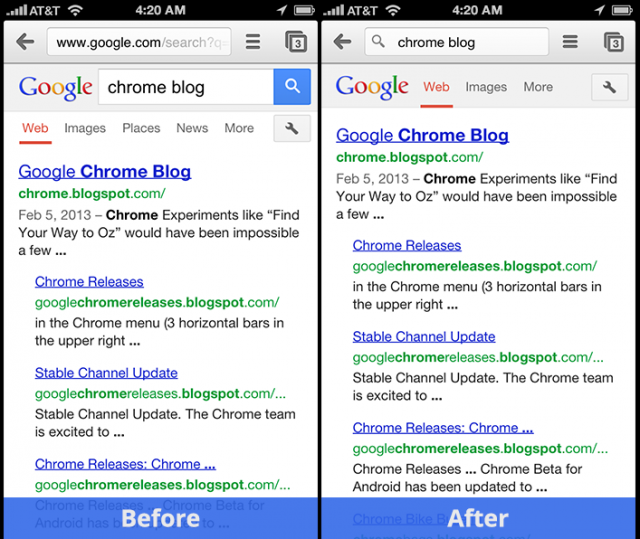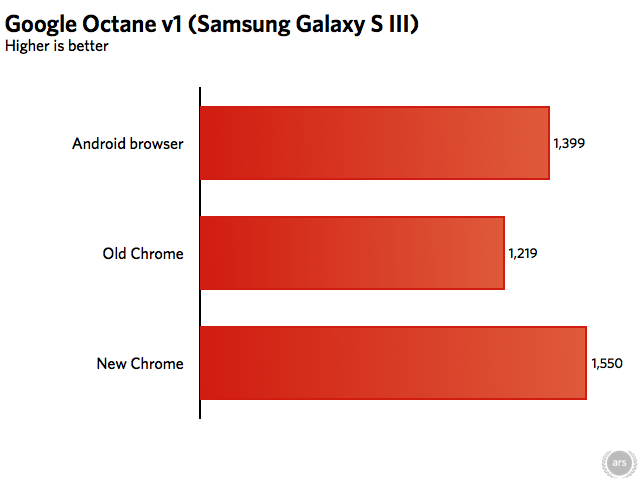Search result

Samsung GT-I9500 believed to be the Samsung Galaxy S IV appears on AnTuTu benchmark, mounting a 1.8Ghz processor and Android 4.2.1 android OS out of the box. The Galaxy S IV is rumoured to feature an Exynos 5 Octa-Core CPU (8-core), Mali-T658 GPU, 4.99″ SuperAMOLED Full HD Resolution Display, 2GB of RAM, 13 Megapixel Rear facing Camera capable of shooting 1080p Full HD Videos at 30FPS and 2 Megapixel front facing camera capable of shooting 720p HD Videos. This will be Samsung's true flagship device for 2013.
The Samsung Galaxy S IV has been rumored to be released around April or May timeframe.

AndroidAuthority ran Geekbench 2 on the new Samsung Galaxy S 4 last week and posted the results on YouTube. As everyone's wondering how the Samsung Galaxy S 4 compares to other popular smartphones. Prime Labs posted the results in the image above.
Some things to consider when looking at the results:
- It's clear that the Samsung Galaxy S 4 will be the fastest smartphone available when it is released in April. What's not clear is how the Galaxy S 4 will handle the increased power and cooling requirements that generally come with faster processors.
- The Samsung Galaxy S 4 is twice as fast as the Samsung Galaxy S 3. Given that the Samsung Galaxy S 3 is less than a year old, that's a remarkable achievement. I am amazed at how quickly smartphone technology is improving.
- The Samsung Galaxy S 4 is also twice as fast as the Apple iPhone 5. Apple has improved performance dramatically in the past (there was 2.5x increase in performance from the iPhone 4S to the iPhone 5). Will they be able to make a similar improvement for the next iPhone?
- The Samsung Galaxy S 4 is also twice as fast as the BlackBerry Z10. However, unlike the Galaxy S 3 and the iPhone 5, the Z10 launched this year, not last year. Will BlackBerry feel compelled to release an updated handset with a faster processor sooner rather than later?
- Android Authority only tested the Samsung Galaxy S 4 with the Qualcomm Snapdragon 600 SoC. We have no idea how the Samsung Galaxy S 4 with the new Exynos 5 Octa SoC will perform, but given how the different Samsung Galaxy S 3s performed I imagine the Geekbench score will be similar.
- Both the HTC One and the Samsung Galaxy S 4 use the Qualcomm Snapdragon 600 SoC, although the HTC One runs at a slower speed (1.7 GHz vs. 1.9 GHz). The HTC One is also running an older version of Android (4.1.2 vs. 4.2.2), so the HTC One's performance should improve slightly once it is on the latest version of Android.


A new smartphone code-named Redhookbay has appeared in benchmark listings. Powered by the 1.6GHz Intel Merrifield dual-core processor, the smartphone apparently runs using Android 4.2.1.
The benchmark listing also reveals the device features like 1280x720p HD display, and PowerVR SGX 544MP GPU.
Intel Redhookbay seems like a reference design so we might start to see the devices depending on it as early as Mobile World Congress 2013. A written report from Taiwanese publication Digitimes also shows that Intel is intending to showcase new Atom processor along with a new smartphone platform at MWC.
Intel, that is trying hard to make a stand it smartphone market, is yet to be at the core of the popular smartphone and a lot of the Intel-powered Android devices have seen average success at best. Even the top manufacturers like Samsung, Sony or HTC are yet to go for Intel processors in their devices as well as the chipmaker is left dealing with select companies like Motorola, ZTE and Lava for smartphones.
The main specifications are as follows:
- Intel made
- 1.6Ghz ~ 2.0Ghz processor (Atom presumably)
- PowerVR SGX544MP GPU
- 1280x720
- Android 4.2.1 JellyBean


Chrome for Android has just been updated and according to Google, it is faster and is more suited to use on small smartphone screens. Furthermore, it has released Octane benchmark results that show a marked 25% improvement from the last update. The new Chrome for Android is also based on the latest V8 JavaScript engine.
To confirm that Chrome for Android is now better, Ars Technica has performed three separate benchmarks on the Octane, Kraken and the SunSpider just to downplay the point that Octane results could be "partial", since it is also owned by Google. The results were stable and it showed that indeed, Chrome for Android is now ahead of the old version as well as the default Android browser. However, it still does not support Flash, which many users are really looking into. But surely, Google must have reasons for not supporting Flash and we only have to wait and see what they have in store for the users. Meanwhile, you can download your latest Chrome for Android over at Google Play.
Source: arstechnica
© 2023 YouMobile Inc. All rights reserved





